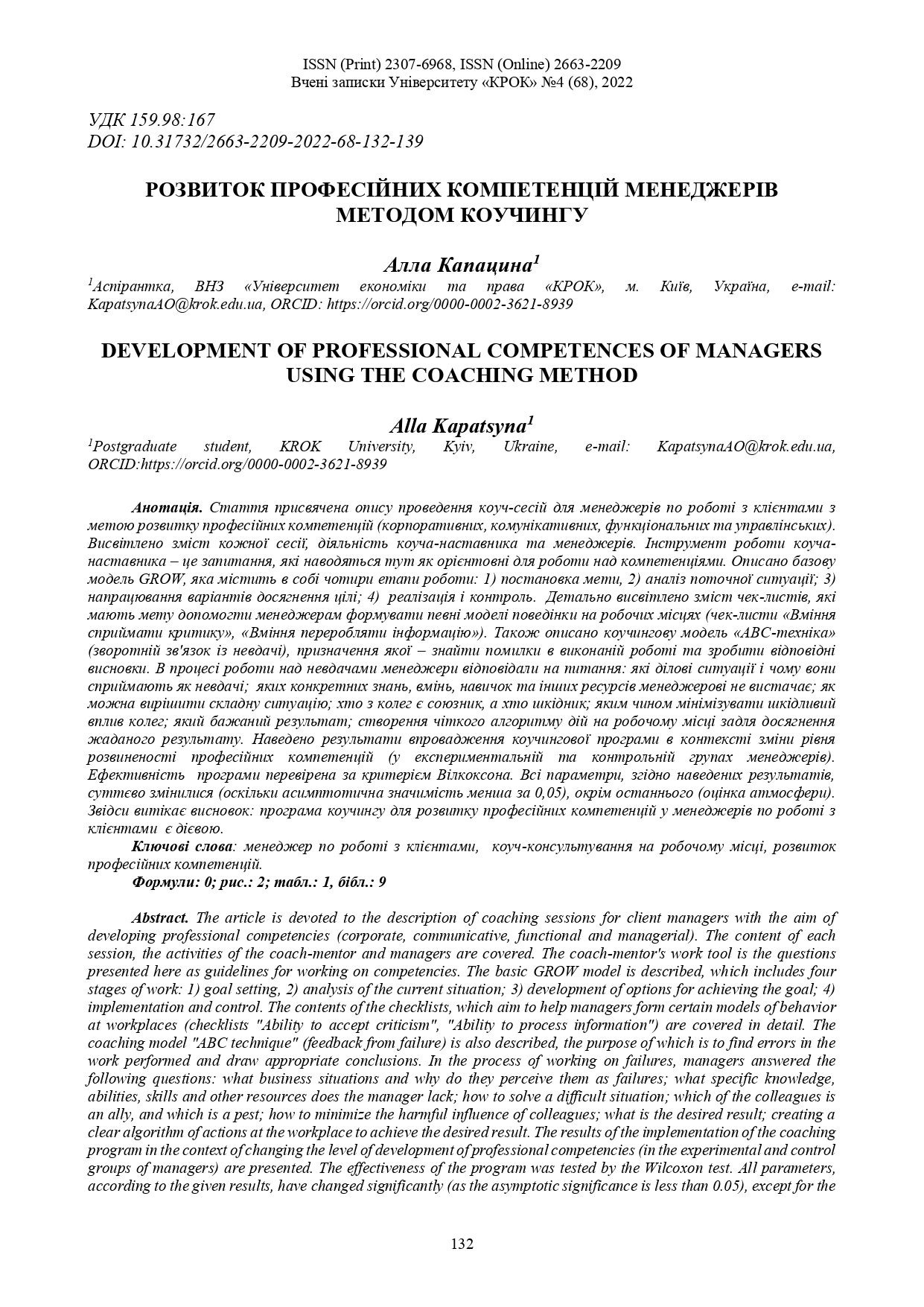DEVELOPMENT OF PROFESSIONAL COMPETENCES OF MANAGERS USING THE COACHING METHOD
DOI:
https://doi.org/10.31732/2663-2209-2022-68-132-139Keywords:
customer service manager, workplace coaching, development of professional competenciesAbstract
The article is devoted to the description of coaching sessions for client managers with the aim of developing professional competencies (corporate, communicative, functional and managerial). The content of each session, the activities of the coach-mentor and managers are covered. The coach-mentor's work tool is the questions presented here as guidelines for working on competencies. The basic GROW model is described, which includes four stages of work: 1) goal setting, 2) analysis of the current situation; 3) development of options for achieving the goal; 4) implementation and control. The contents of the checklists, which aim to help managers form certain models of behavior at workplaces (checklists "Ability to accept criticism", "Ability to process information") are covered in detail. The coaching model "ABC technique" (feedback from failure) is also described, the purpose of which is to find errors in the work performed and draw appropriate conclusions. In the process of working on failures, managers answered the following questions: what business situations and why do they perceive them as failures; what specific knowledge, abilities, skills and other resources does the manager lack; how to solve a difficult situation; which of the colleagues is an ally, and which is a pest; how to minimize the harmful influence of colleagues; what is the desired result; creating a clear algorithm of actions at the workplace to achieve the desired result. The results of the implementation of the coaching program in the context of changing the level of development of professional competencies (in the experimental and control groups of managers) are presented. The effectiveness of the program was tested by the Wilcoxon test. All parameters, according to the given results, have changed significantly (as the asymptotic significance is less than 0.05), except for the last one (atmosphere assessment). The conclusion follows from this: the coaching program for the development of professional competencies of managers working with clients is effective.
Downloads
References
Downey M. Effective Coaching: Lessons from the Coach's Coach. London: Cengage Learning, 2003. 279 р.
Forsythe Patrick. Improve Your Coaching and Training Skills. London: Kogan Page, 2008. 160 с.
Masha Malka. The One Minute Coach. USA: Inborn Genius Corporation, 2007. 134 с.
Ward P. 360-Degree Feedback. London: CIPD House, 2000. 280 p.
Starr J. The Coaching Manual. The definition guide to the process, principles and skills of personal coaching. USA: Pеrson Prentice Hall Business, 2008. 359 р.
Кнапп Д., Зерацкі Д. Знайти час. Як щодня фокусуватися на тому, що справді важливо. Київ: Yakaboo Publishing, 2020. 192 с.
Джонсон Д. Соціальна психологія: тренінг міжособистісного спілкування. Київ: «КМ Академія», 2003. 288 с.
Вітмор Д. Ефективний коучинг. Принципи і практика. Київ: КМ-БУКС, 2019. 192 с.
Сингаївська І. В. Зростання психологічної компетентності керівника освітньої організації у процесі підвищення кваліфікації. Актуальні проблеми психології. Т.1: Організаційна психологія. Економічна психологія. Соціальна психологія. Ч. 24. К.: Вид-во «А.С.К.», 2009. С. 87–91.

Downloads
Published
How to Cite
Issue
Section
License
Copyright (c) 2022 Алла Капацина

This work is licensed under a Creative Commons Attribution 4.0 International License.

